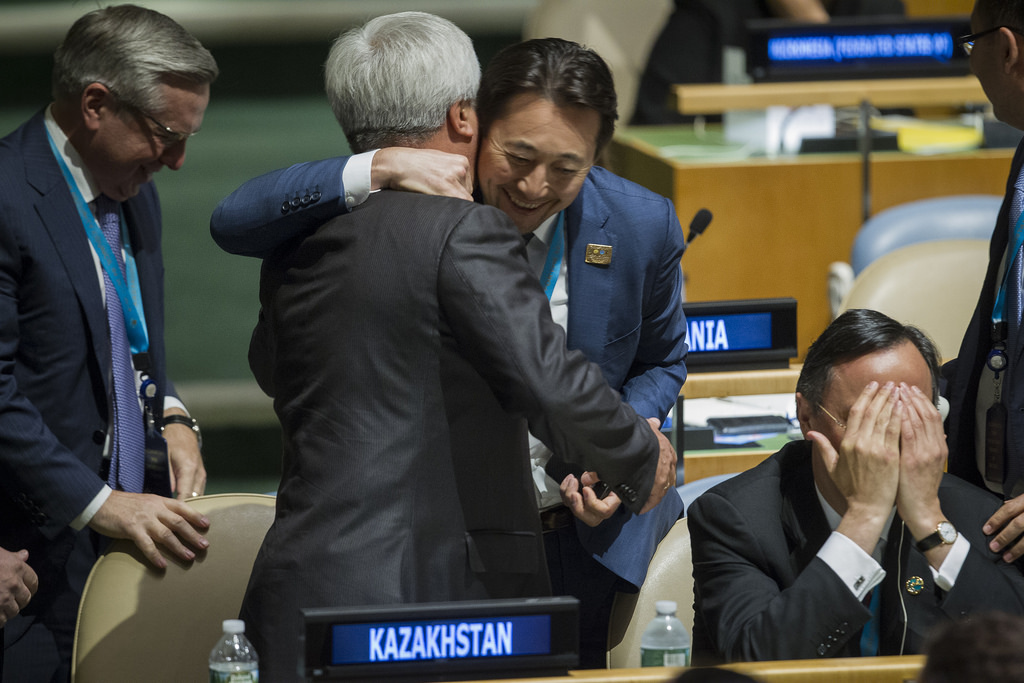On January 31, Kazakhstan concluded its month-long presidency of the United Nations Security Council.
“Kazakhstan was an exceptionally effective chairman of the UN Security Council,” said Stephen Hickey, a political coordinator at the United Kingdom’s mission to the UN.
Prior to assuming the presidency, Kazakhstani diplomats announced that they would focus their efforts on multinational issues Astana has prioritized in recent years, including nuclear non-proliferation, the situation on Afghanistan, and the tense situation in the Middle East, especially the civil war in Syria.
Kazakhstan is the first Central Asian country to be elected to a two-year term on the Security Council, the high-profile and permanent UN body that investigates international disputes and situations that often involve global tension. The Security Council is always comprised of five permanent members (Britain, China, France, Russia and the U.S.) and 10 non-permanent members, which are elected in groups of five every year to two-year terms. Non-permanent members do not have veto power over resolutions tabled for a vote, while the permanent five do.
Within the span of just a few weeks, Kazakhstani officials primarily focused on what is perhaps the country’s key foreign policy issue, given its history with the effects of nuclear weapons testing during the Soviet era.
“Kazakhstan’s nuclear-free status may serve as an example and practical guidance to other countries. I say this on the basis of our own experience,” President Nazarbayev said while addressing a Security Council meeting on non-proliferation of weapons of mass destruction, held on January 18.
“We call on all other states to follow our example. We have called on Iran to do so, and now call on North Korea to follow suit. The way to counter the threat of nuclear weapons throughout the world is through trust.
Kazakhstan voluntarily abandoned nuclear weapons in the early 1990s, shortly after the collapse of the USSR, which had left remnants of its nuclear program on Kazakhstani territory.
Since that time, Kazakhstan has worked to become a mediator between countries seeking nuclear weapons, mostly through sharing stories of its citizens and recounting experiences with residents still living with the horrific effects of radiation.
Kazakhstan is a member of the Nuclear Non-Proliferation Treaty, the Comprehensive Test Ban Treaty and the Central Asian Nuclear Weapon Free Zone, all which promote nuclear disarmament, non-proliferation, and control, accounting and physical security of nuclear material.
“I think that the focus on nuclear non-proliferation – and Kazakhstan itself [which] has experienced the consequences of nuclear explosions – has taken center stage in the Security Council. This topic has become even more urgent in connection with the threat from North Korea,” Stephen Hickey said, according to the 24.kz news website.
Kazakhstan’s Permanent Representative to the UN Ambassador Kairat Umarov did not focus all of his attention on nuclear-related matters, however.
Afghanistan is a major concern for Kazakhstan, given its close proximity to Kazakhstan’s borders within Central Asia. Astana considers the threats of terrorism and rogue groups operating in Afghanistan and throughout the region a serious threat to its security.
For the first time in seven years, a Security Council delegation visited Afghanistan to observe the situation first-hand from the ground, and met with Afghan leadership.
“Our visit against the background of the events that are taking place in Afghanistan today, i.e. these terrorist attacks that took place in January, allowed all the member states of the Security Council to really pay attention to the region,” Umarov said, referring to the attacks on a military post in Kabul on January 28.
On June 28, 2016, Kazakhstan was elected to a two-year, non-permanent position on the council. The presidency position, which lasts for one month and rotates amongst council members, is said to have contributed to Kazakhstan’s growing importance in international affairs. But some analysts say Kazakhstan’s role last month has been exaggerated.
“Personally, I do not see any triumph. Yes, we became the first to preside over the Security Council among the countries of Central Asia. Yes, we participated in solving difficult international issues. And that’s all. But one cannot inflate its value so artificially,” Kazbek Beysebayev, a former diplomat, told Sputnik.







 President Aliyev emphasized the critical role of the North-South Transport Corridor in fostering transport cooperation between Azerbaijan and Russi...
President Aliyev emphasized the critical role of the North-South Transport Corridor in fostering transport cooperation between Azerbaijan and Russi...
 Russian Foreign Minister Sergei Lavrov has reasserted that Moscow has no intentions to stop the fighting in Ukraine, even if peace talks commence.
Russian Foreign Minister Sergei Lavrov has reasserted that Moscow has no intentions to stop the fighting in Ukraine, even if peace talks commence.
 Iran has refuted reports of alleged damage to Shimon Peres Negev Nuclear Research Centre located southeast of Dimona, Israel, during the recent air...
Iran has refuted reports of alleged damage to Shimon Peres Negev Nuclear Research Centre located southeast of Dimona, Israel, during the recent air...
 Iran and Pakistan have signed eight cooperation documents in various fields, and agreed to strengthen ties to fight terrorism in the region.
Iran and Pakistan have signed eight cooperation documents in various fields, and agreed to strengthen ties to fight terrorism in the region.



